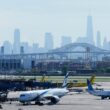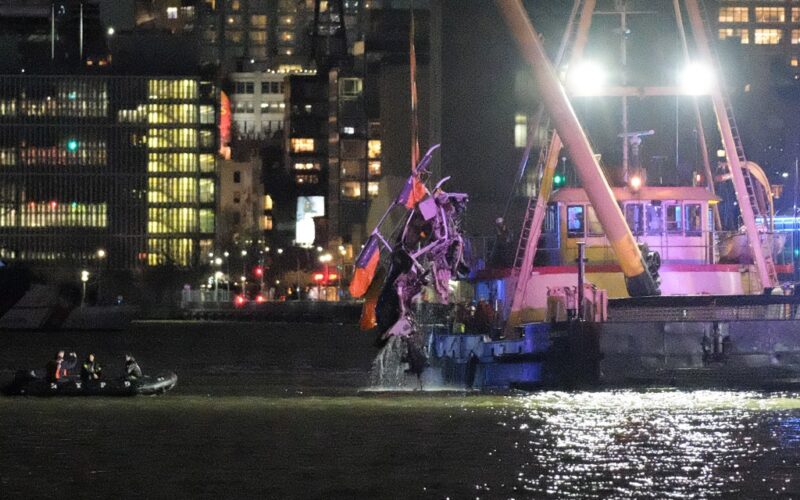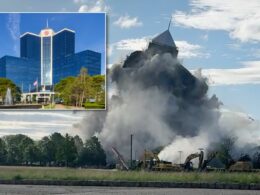The recent tragic helicopter crash into the Hudson River, which claimed six lives, has left our city heartbroken and once again grappling with difficult questions about public safety and aviation policy. What began as a routine sightseeing tour ended in devastation for families, first responders, and an entire city that has grown all too familiar with the dangers posed by non-essential helicopter flights.
As we mourn this loss, we extend our deepest gratitude to the NYPD, FDNY, and other first responders whose swift action contained the wreckage, mitigated fuel-related hazards, and prevented further tragedy. But this moment calls for more than reflection, it demands decisive action.
The danger of helicopters in a densely settled city is not a new concern. For years, New Yorkers have complained about the risks, relentless noise, and harmful emissions from low-flying helicopters. In 2023 alone, more than 59,000 noise complaints were filed with 311. These flights routinely disrupt life for residents in Manhattan, Queens, Brooklyn, and Randalls Island, many of whom live or work directly beneath common flight paths. These are often the same communities already burdened by environmental and health disparities, making helicopter traffic yet another layer of harm in neighborhoods long denied meaningful relief.
As Council leaders and prime-sponsors of this legislation, we’ve held oversight hearings, convened advocates, and worked closely with stakeholders, from Stop the Chop NY/NJ and the NYC Economic Development Corp. (EDC) to heliport operators and impacted residents, to craft a reform package rooted in data, urgency, and equity. What we’ve heard is clear: the status quo is unsustainable. Non-essential helicopter operations bring in less than $2 million a year, yet the toll on public health, climate resilience, and quality of life is immeasurably greater.
That’s why we worked to pass the Helicopter Oversight Act, Intro 26-A coupled with Resolutions 85-A, 226-A and 233. Intro 26-A will prohibit non-essential helicopter flights from city-owned heliports unless they meet the most stringent Federal Aviation Administration (FAA) noise standards, known as “Stage 3.”
This bill targets sightseeing tours and luxury commuter flights operating out of the Downtown Manhattan and E. 34th St. heliports, which are owned by the city and operated under contracts with the EDC. Essential operations, including law enforcement, emergency response, news gathering, and film production, remain fully exempt.
The ban on non-compliant helicopters will take effect in late 2029, giving the industry ample time to adapt and transition. In the interim, EDC will be required to report publicly on the percentage of flights at these heliports that do not meet the Stage 3 standard, increasing transparency and accountability in the years leading up to enforcement. These requirements will be written directly into the city’s contracts with heliport operators, making compliance a non-negotiable condition of use.
Some of the most commonly used tourist models, often the loudest, are also the most outdated and carbon-intensive, emitting up to 950 pounds of carbon dioxide per hour, compared to just 22 pounds from the average car. While the FAA regulates our airspace, the city retains authority over how its heliports are used. Intro 26-A leverages that power to phase out the worst offenders and promote quieter, cleaner alternatives.
Fully electric helicopters aren’t science fiction; They are already in development and being tested around the world. Electric vertical takeoff and landing (eVTOL) aircraft offer significantly lower noise levels, reduced fire risk, and fewer mechanical failures, making them safer, more sustainable options for dense urban environments like New York City. Intro 26-A embraces this innovation while advancing environmental equity and public health.
We’ve already begun electrifying our school bus fleet and expanding EV infrastructure citywide. Electric aircraft are the logical next step. This legislation fits squarely within the Council’s broader climate goals and sends a clear message: clean air and quiet skies are not luxuries; they are necessities.
Intro 26-A is not anti-aviation. It is pro-innovation, pro-safety, and pro-environmental justice. It ensures that the skies above our city reflect the values we hold on the ground.
Let us not wait for another tragedy to spur change. With the passage of Intro 26-A, we have a chance to lead the nation in sustainable urban air policy and to build a city where every New Yorker can breathe easier, no matter their ZIP code.
Farías is a Bronx Council City member and serves as majority leader. Powers is a Manhattan City Council member.








